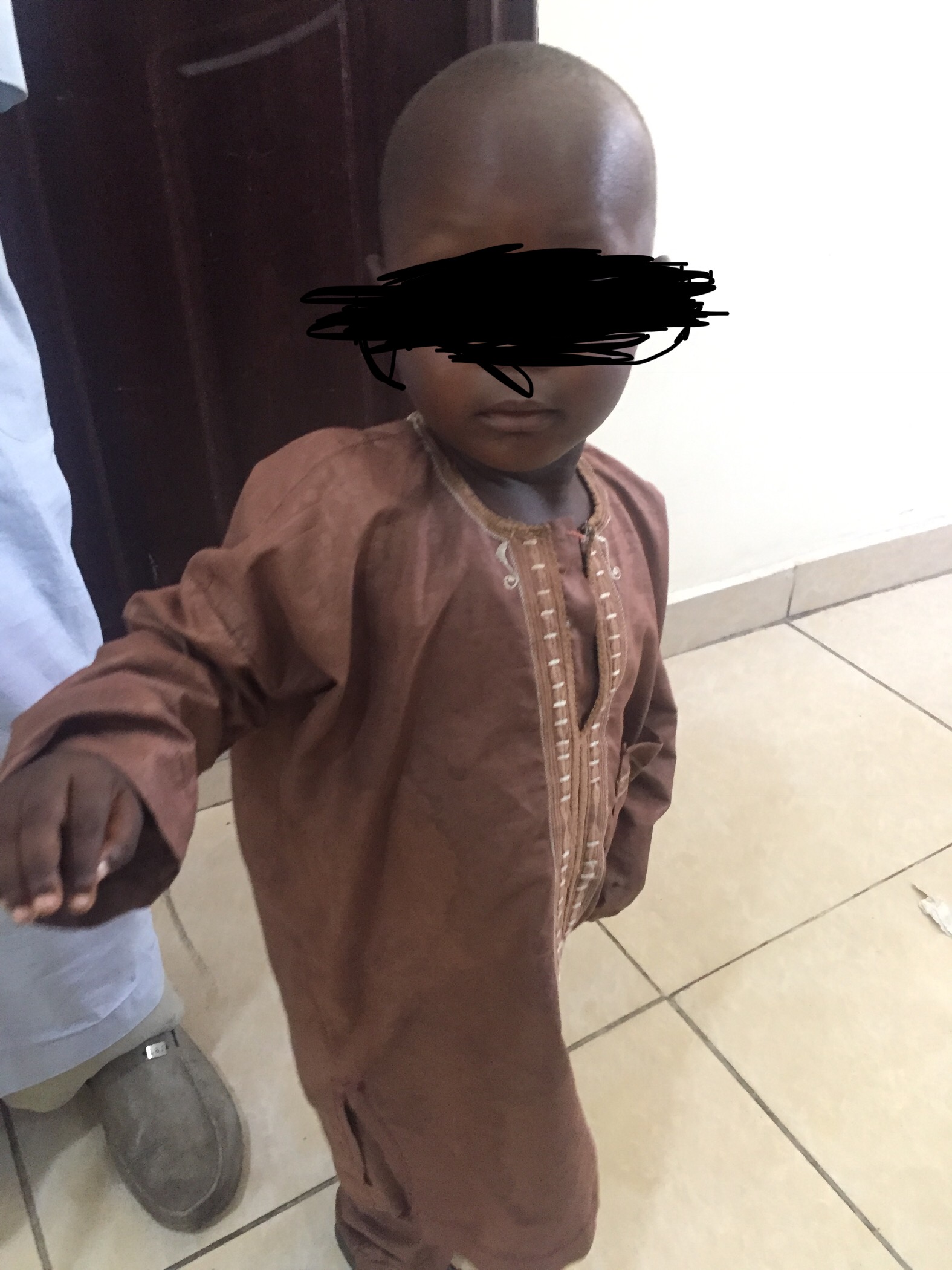
Before RUTF
By Tobias Lengnan Dapam
3 -year old Umar Sani (not real name), can now heave a sigh of relieve and play with other children in his community, considering his rapid transformation by Ready-to-use Therapeutic Food (RUTF).
When Umar was 6 months old, family feud forced his mother to abandoned him with no proper care. The 6 months old at the time was left in the care of his octogenarian grandfather, Modu Baba, from Dikwa Local Government Area, Borno State.
The octogenarian told our reporter that Umar’s mother initially abandoned him with his father ofter their squabble which ended in divorce. But that the father could not take care of him because he was physically challenged and battling for survival.
Considering how his disability will affect the growth of the child, Umar’s father handed over the boy in to the care of his aged father in order to provide succour for the baby.
But the father who was displaced when insurgents raked Dikwa local government was caring for the baby in Bolori Internally Displaced Persons (IDP) camp.
In the IDP camp, Umar’s grand father worked as a security guard to earn money that will enable him provide for his grandchild Umar, whom he said was growing very thin and losing weighed, with protruding stomach. He didn’t know that the changes in his grandson were signs of Severe Acute Malnutrition (SAM).
The grandfather who spoke in Hausa said, “when I took him, Umar was strong and healthy, playing endlessly with other children. After sometime, I noticed he was growing thinner and could not play the way he used to; as each day passes by, his health challenges were increasing and his rips could be counted from a distance. Also, his stomach was becoming bigger and he could hardly stand on two legs without any support. At that time, I knew something serious was wrong with him, but the problem was that I didn’t know exactly what was wrong with him. In that confused state of mine, I took him to a UNICEF-supported medical clinic in the IDP camp, where I was told he was suffering from Severe Acute Malnutrition. I also saw other children with similar condition as Umar’s. There, the health officials commenced treatment on Umar with Ready-to-use Therapeutic Food (RUTF).
“He took the RUTF for some months, and was back on his feet. I am very happy now because he is not sick anymore. He is also fat and playing the way he used to. There is no more health challenges as he eats and drink without any problem.
Meanwhile, nutrition experts said the miraculous Ready-to-use Therapeutic Food (RUTF), is a fortified peanut butter-like paste containing fats, dietary fiber, carbohydrates, proteins and essential micronutrients. They said a vast majority of children with severe acute malnutrition respond extremely well to treatment with RUTF. “It ensures rapid weight gain in severely malnourished children and has improved the lives of hundreds of thousands of children over the years. Malnutrition causes irreversible brain damage and compromised intellectual capacity in adulthood, leading to reduced productivity and an estimated 16% loss in the Growth Domestic product.”
Also, statistics revealed that an estimated 2.5 Million Boys and Girls under the age of 5 Suffer from Severe Acute Malnutrition (SAM) every year in Nigeria. Unfortunately, 50 children are diagnosed with severe acute malnutrition every day at various communities and camps for IDPs in conflict-ravaged Borno State.
According to Nutrition Sector annual projections, an estimated 371,000 Boys and Girls under the age of 5 in Borno, Adamawa and Yobe states will suffer from Severe Acute Malnutrition (SAM), a life- threatening condition. According to the latest Nutrition Survey, the prevalence of Global Acute Malnutrition (GAM) among Boys and Girls aged below 5 Years is 11% in Borno, 13% in Yobe and 6% Adamawa, indicating state of emergency according to World Health Organization classification.
The Nutrition Sector estimates that there will be 258,950 Boys and Girls aged below 5 Years suffering from SAM in 2020 in Adamawa, Borno and Yobe States. To ensure the provision of comprehensive treatment, N5 billion is needed to procure 258,950 cartons of RUTF for SAM treatment.
These consistent challenges and disturbing statistics made the United Kingdom Department for International Development (DFID), to commit N18.5 billion to address the deteriorating nutrition-related crisis in Borno, Yobe and Adamawa states from April 2019 to March 2020. The fund is expected to succeed in eight areas notably community-based management of acute malnutrition, infant and young child feeding practices, micro nutrient supplementation, health, child protection, water and sanitation hygiene, early childhood development and surveillance. A Nutrition Specialist, United Nations Children’s Fund (UNICEF), Aminu Usman, who made this known at a two-day media dialogue on Integrated and Timely Response to Nutrition-Related Humanitarian Needs, in Borno State recently, said the
money was needed to enhance the purchase of Ready to Use Therapeutic Food (RUTF) in Adamawa, Borno and Yobe states.
While noting that a lot has been achieved in addressing the challenges of malnutrition in the region, he raised concern over new cases of severe acute malnutrition due to influx of new arrivals of internally displaced persons, lack of access to hard to reach areas and late presentation of malnourished children whose parents were ashamed to seek treatment. “DFID has committed a total of £41 million (N18.5 billion) to address the deteriorating nutrition related crisis in Borno, Adamawa and Yobe states from April 2019 to March 2020.
According to him, the Borno project, tagged “flexible integrated and timely (FIT) Project: Multi-sectoral nutrition project” is aimed at detecting emerging/deteriorating nutrition-related crises in the state through an agile nutrition surveillance system, providing timely response through the implementation of an integrated basic nutrition package.
He said the Yobe project which is tagged “working to Improve nutrition in Northern Nigeria (WINNN), is aimed at improving maternal and young child nutrition in the north.
Usman further informed that DFID has also donated the sum of N18.5billion for procurement of Ready to Use Therapeutic Food (RUTF) in three Northeast states of Borno, Yobe and Adamawa.
He further stressed that there is need for a robust contigency plan to absorb any shock in the affected areas as nutrition sector report has estimated that 258,950 children will be affected by severe acute malnutrition in 2020.
“There is a gap of N4.4 billion needed to necessitate the procurement of ready to use therapeutic food for severe acute malnutrition treatment in Adamawa, Yobe and Borno states”.
Usman further urged the government to ensure increased funding to meet the nutritional needs of the citizens especially the Internally Displaced Persons (IDPs) as there had been an influx of IDPs which further exacerbated the already poor nutrition situation in that part of the country.
He said despite the DFID intervention, malnutrition is still at an emergency level in the region, requiring more funding from state governments.
However, Sanjay Kumar Das, Nutrition Manager for UNICEF Maiduguri Office said despite the emergency situation in the northeast, the situation is improving.
He said some of the things that increases malnutrition in those states include; food insecurity, poor hygiene and poor health care services. “ With poor healthcare services in these states, there is also increase in childhood illnesses which must be addressed to provide a brighter future for children.
“Malnourished children are prone to diseases. Also, there is increase in under five mortality. We need more investment, to solve the problem. And there is need for continuous sensitization and education of the population to be aware of the dangers posed by malnutrition.”
He said that insecurity has also denied people access to quality healthcare and food.
To ensure success, a military medical personnel familiar with the region who does not want her name in print said a state of emergency in the northeastern part of the country is necessary to address malnutrition.
“They need health services. Also, there is massive destruction in the north east, we need to cry out now to address this. Majority of women don’t know how to properly take care of their children. Most are teenage mothers. They need skills on how to train babies and feed them with breast milk. They need basic skills and need to do their best. Women need health care and capacity in the society.”
Speaking on the critical situation in the northeast, she said a lot needs to be done to stamp out the rampant cases of malnutrition in northeastern states of Yobe, Borno and Adamawa.
“There is high rate of illiteracy here and young girls are being married without any formal education. There is need to ensure that these young girls are educated so as to enable them take care of their children. We need a lot of sensitization in this part of the country so as to address these challenges.”
The military officer said there is need for adequate investment in nutrition, which she said will help reduce the negative trend of malnutrition and tackle the issue of stunting, wasting and obesity to its minimal level”.
She said poor food security, sub-optimal water, as well as poor water hygiene and sanitation has further fueled poor nutrition in Nigeria.
“Malnutrition is an emergency situation in Nigeria, we need an integrated approach from all sectors to tackle this emergency”.
“Malnutrition has led to almost 50 percent deaths in children, high mortality rate, irreversible brain damage and compromised intellectual capacity in adulthood as well as over 16 percent loss of the nation’s gross domestic product”.
“Malnutrition can be curbed through creating sustainable and resilient food system, providing nutrition related education for all, monitoring food fortification and ending conflicts, providing free food supplement to children and pregnant women. The illiterate population can get the right information through continuous education and counselling of caregivers on how to adequately feed their children and wards.”


